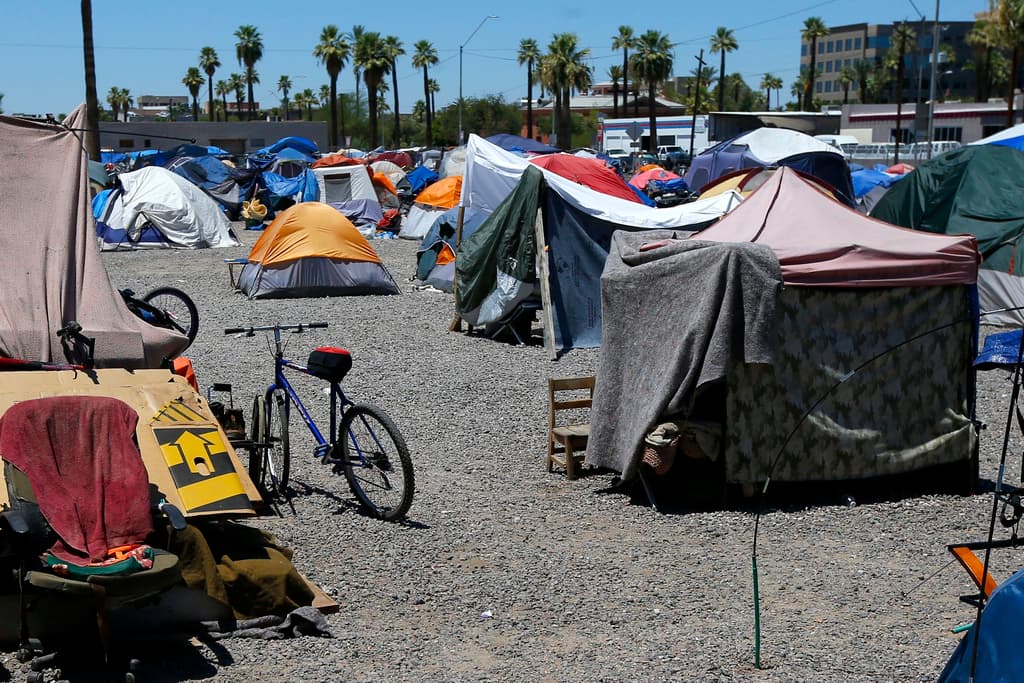Phoenix Business Owners Find Relief as Court Orders City To Clear Homeless Encampment
The ruling may set an example to other cities overwhelmed by unsheltered homeless individuals.

Burning human bodies, biohazardous human waste, cinder blocks thrown through car windows: Described in a court ruling, these are scenes from Arizona’s largest homeless encampment. A judge’s order to the city of Phoenix to clear the area may set an example to other cities overwhelmed by the homeless.
In a win for the business and home owners who filed a lawsuit after seeking assistance from the city for two years, Phoenix officials have until November 4 to clear the city’s most concentrated homeless area, called the “Zone.”
A Maricopa County Superior Court judge, Scott Blaney, issued the ruling, labeling the encampment a “public nuisance” that the city has “created and maintained” and ordering the city to keep it clear of tents, waste, and criminal activity.
The litigators representing property owners at Phoenix filed a similar lawsuit Wednesday at Tucson. Other cities may follow their lead as large urban areas nationwide grapple with homelessness.
“We certainly hope that this will be used as a model for other cities where residents can challenge the rise of public encampments,” attorney Ilan Wurman, who represented the home and business owners in the area, tells the Sun. “We hope the permanence of the decision — assuming of course that it’s upheld on appeal — will again give ammunition to other residents of other cities facing similar problems.”
The decision comes after a months-long dispute. In March, the court issued a temporary order requiring the city to take steps to clear the encampment, and has since “received evidence” that the city was indeed conducting cleanings and increasing law enforcement. Wednesday’s ruling, though, says the court has “little confidence” that Phoenix “will continue to abate the public nuisance” without a more permanent court order.
City employees often use federal court decisions to “abdicate responsibility over the public encampment crisis” by arguing that they must have available beds for each homeless person before they can enforce anti-camping ordinances, Mr. Wurman says.
“That’s simply wrong,” he says. “You only need a bed for any unsheltered person who would accept that bed.” Because many shelters have rules against using drugs or living with partners or pets, many people choose not to accept the available beds, he notes.
“What we saw in the Phoenix case is evidence that only 15 percent of unsheltered people in downtown Phoenix would actually accept a bed if it was offered to them,” he adds. “That means you don’t need 1,000 beds, you need 150 beds. You need only as many beds as those who would accept them.”
The judge agreed, noting that as many as 60 to 80 percent of homeless individuals can be “service resistant” — choosing to live in tents instead of following shelter rules — when cities do not enforce bans on camping.
“Although unthinkable for the general public, there are many individuals in the Zone that choose to live in a tent on the sidewalks or in the street, with three meals each day provided by the Human Services Campus and the ability to engage in antisocial behavior and drug use,” the ruling notes.
Phoenix’s government is working to offer every individual shelter, a city spokeswoman, Kristin Couturier, tells the Sun. “The City of Phoenix is disappointed with the Court’s ruling,” she says. “The City is reviewing the Court’s ruling and exploring legal options.”
The ruling found that the city was “singularly focused” on addressing the needs of the homeless “without equal regard for the City’s constituent property owners, business owners, employers and their employees.” It details the “constant risk of violent crime” to business owners in the area because of meth and fentanyl usage in the “Zone,” fires, and assaults.
The ruling also describes the area as a “a serious environmental nuisance — a biohazard — that empties into the state’s waterways,” as homeless individuals “defecate and urinate in the open,” leaving local residents and business owners to clean after them.
A public policy think tank, the Goldwater Institute, filed briefs in support of the property owners. While Wednesday’s ruling doesn’t set technical legal precedent, “there’s no question that the judges look at each other’s decisions and are going to be influenced by them,” the Goldwater Institute’s legal affairs vice president, Timothy Sandefur, tells the Sun.
The ruling is “a big win for property owners and business owners and taxpayers throughout Phoenix,” Mr. Sandefur says. “But the next step is to have the city actually follow the law, and the reason this lawsuit was filed was because the city was refusing to follow the law.”

